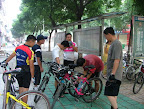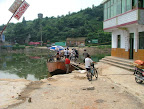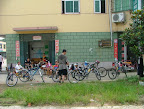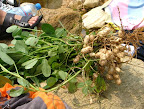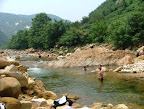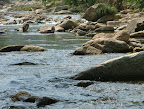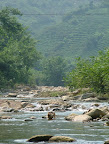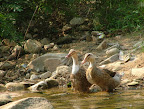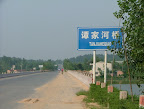I was starting to get bored so I had the idea of going for a bike ride. I had actually been thinking of this from the beginning of the summer. However, my first plan didn't work because I did other things.
So, with the new plan, I thought an interesting route to take would be the road to
I then went and purchased a set of panniers (saddlebags) for the bike and had a cargo cage placed on the front rack. It was at this point that I noticed that one of the brackets for the front rack was broken and I returned to the bike shop and had it repaired. They added a new brace at, again, no charge. At this point, the front rack was probably stronger than it was when I purchased the bike, and the light was no longer bouncing around.
I also got a hammock. I went all over looking for a set of ratchet straps but was not able to find any. Along with the hammock I got an atlas for
I then went to the office and told them that I intended to ride to
The point of telling them that I had been going on long rides was to let them know that I was already an experienced rider. However, they were rather adamant that I could not make a solo multi-day ride through
My response was to tell them that I would instead ride to Luoshan; of course, from there I intended to ride to ride to Huangchuan, to Gushi, to
I started my ride in mid-afternoon, which was not the best of plans. I skirted the town instead of riding through downtown with a full load on the bike. This took me a while as it is a larger town that it looks. I can easily believe the population estimate of over 2million in this "small" town.
On the first day I rode about 85km and was about 25km from Huangchuan when I decided that it was time to start looking for a place to sleep. That is when I came upon, what turned out to be, a great idea. Instead of going with my plan to sleep outside, I tried something else. I remembered that most of the schools are boarding schools and this was summer. That meant that the dorms were going to be empty. I remembered that the colleges often open the dorms in the summer for travelers and decided to try getting a dorm room.
I rolled into a school and asked for an English teacher, so that I would be able to explain what I wanted. There was no English teacher and I was about to roll out when someone shouted, "Wait!" I turned back and called a student to translate for me.
It turned out that they were hesitant to offer me a room because the conditions were very poor. I told them that my other option was to sleep under a tree.
I was then offered a teachers room and the teacher in charge of the campus, and his wife, prepared me dinner. The dinner was good and, although we had many language difficulties, we managed to talk for a while. I was in Zhai He at the number two middle school. I have to say that I never did see a number one middle school. I was surprised by the number of students that were present. It seems that some of them can, for various reasons, some of them financial, return home in the summer, others were the children of the other teachers that were on campus through the summer.
The best English was spoken by one of the girls. She was in the eighth grade and she did a lot of the translating for us during our dinner. Before dinner I was kept busy working with the students by reading their English study books to them.
I was also asked to sit with them and watch the foreign television channel with them. This is a Chinese station that plays Western news and some old documentaries. The teacher told me that this was part of the problem. He was trying to work on his English and was simply unable to understand a word of what was being spoken. I was asked to tell him what was going on in the news story, which I did. However, I saw his problem right off. The upper caption in the picture was E&F. Yes, you can guess, the reason he was unable to understand was that the news program was in French and there was nothing, that he was able to read, to indicate that it was not English. Even the subtitles were French (and without them I would not have been able to have told him what was going on in the story).
The bed was a cot made of bamboo slats, the toilets were about 100m away. I was advised to use the assembly field during the night instead of walking the distance. In the room, there was a small fan for ventilation and a coal fire (keep in mind that it was already quite warm) to keep the water hot. I was also provided with two plastic pans for personal washing. After washing, I also used these to wash my jersey and riding shorts so that they would be clean at the start of the day. Of course, the next morning the teachers wife took these and washed them, I do not think that she realized that I had washed them during the previous night.
The next morning I left after being taken to a breakfast in the small village and getting my riding clothing off the line. It is hard to leave because the people had been very nice and they want the company. However, I had planned a full day of traveling.
In short order I passed through Hunagchuan and continued on. I decided that I wanted to be in Gushi before lunch and made it by about
I stopped at a truck stop, with a church just down the road, and had my lunch. The truck drivers were very amazed at the distance I had come from.
From Gushi, I continued to ride until I entered
This section of expressway was not on my map and it looked to be new. However, I also saw no alternate route. I rode about 20km on this but ran into two problems. The first was water. Generally, when riding I empty one 600ml and start looking for a place to purchase another. By the time I find a place I am about done with the second 600ml bottle; so, I buy two. I also keep one in reserve on a general basis. However, along the expressway there are not the little shops and stands along the road and so I was concerned with finding water when I needed it.
The second issue was simply that riding along the expressway was boring. I saw a sign saying that it was another 40km to the next stop and 150 to the end of the stretch of expressway and I turned back.
Now, what I should have done, but I did not think of at the time, was to wave down a passing long-distance bus and put the bicycle in the hold while riding the same bus to the end of the expressway section. Like I said, I just did not think of it.
Instead, I turned back and made it, almost, back to Gushi. I was about 20km short of it when I went looking for another school to stay at. This school did not provide as warm of a reception. They were under the impression that I was a spy, after all, why else would a foreigner be riding around
There were no real attempts conversation with these hosts and I heard a phone conversation between them and the PSB that was about me, I ended up under the impression that the PSB were fully aware of my ride. This impression was, in a large part supported by the reactions by the people at the toll stations I rode by. At the first toll station there was genuine surprise to see me go by; but, from then on there was no surprise. However, as I came in to view, there were phone calls being placed.
I must have entered Gushi from a different angle because the first time, as I said, I bypassed it; however, this morning I rode through it. This was convenient because I was ready for breakfast. I was concerned though because, for over an hour, I was on roads that I did not remember from the previous day.
As I returned to G312 I decided that there was no reason to not take a bus, as I had planed to return by bus at the beginning of the trip. The first medium-distance bus I caught up with, while it was stopped, did not take me because I told them that I wanted to go to Xinyang. They did not want to take me because they were not going that far.
It is a good thing that I missed the first bus; as, while I was riding those additional hours I came across a funeral procession. I, simply, had seen none in the villages in
About an hour or two later I chanced upon another medium-distance bus. This time I did things a little different. I first looked at the destination sign in the window. Then, when they asked where I wanted to go, I told them Huangchuan. After I was on the bus I told the attendant that my final destination was Xinyang. As a result, when we got to Huangchuan they stopped across the street from the long-distance bus station and shouted to a driver; by doing this, they made sure that there would be room for my bike in the hold.
This bus took me all the way back to Xinyang in air-conditioned comfort. As I passed places I had slowly pedaled by just short days before, I thought that what advantage the bus had in speed, it lacked in the ability to add wisdom and experience. In about two days, and nights, in the Chinese countryside, I had pedaled 315km; of course, that did not count the time and distance on the busses.



